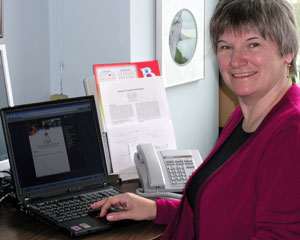October 29, 2004
Improving distance communication goal of new national network
by Charles Crosby
Developing technologies to make virtual collaboration over distances every bit as productive and efficient as working face to face is the goal of a new national research network.
A $4.5 million commitment from Science and Engineering Research Canada (also known as NSERC) will create the Network for Effective Collaboration Technologies Through Advanced Research (NECTAR).
The vast geography of our country makes this an appropriate focus for a national research initiative. "People across Canada need to be able to collaborate effectively despite the large distances that separate them," said federal Industry Minister David Emerson, as he announced the contribution Tuesday, October 12th. "The tools developed through this research network will help Canadian companies bring new products and services to market to further support collaboration."
 | ||
| Associate professor of Business Administration Elaine Toms holds the Canada Research Chair in Management Informatics and is a key researcher in a new national network. | ||
Dalhousie's Canada Research Chair in Management Informatics, Elaine Toms, an Associate Professor in School of Business Administration, is a key contributor to the project. "My area of research is information interaction," says Toms. Her research examines problems in managing information, with one aspect being information presentation, and another aspect being information access.
"It's looking at a two-pronged problem. One is looking at information presentation. How do we display and represent content to people?," she asks. "One example of content is the American ballot in the last American presidential election. If you look at the way selected pieces of content were displayed or represented to people, people could not make sense of the ballot. Many articles have been written about that ballot in Florida. Ordinary people did not understand what the information meant based on the way the information was displayed. Likely everyone could read what was on the ballot. But the way the information was represented was misinforming."
The study will also explore information access, or how we find the information that we need. "The classic problem here is search engines - how do we get what we want?" she asks. "My classic example is going to a doctor in a foreign country. I only know two understandable words - 'pain' and 'arm.' Like the doctor, a search engine has a couple of words and it has to make sense of them. Right now, it does a pretty good job of matching words. If you want a hotel in Timbuktu, it can find a hotel in Timbuktu pretty easily. But if you wanted to find out whether to get a flu shot this year, you would probably have to navigate many, many documents to find a good answer to that question."
With NECTAR research, Toms will be applying those research interests to webcasting, working in collaboration with Ron Baecker at the University of Toronto. Webcast technologies stream live presentations over the Web, but people also like to view webcasts after the event. Using this funding, Toms will be looking at how to simplify information finding within a Webcast, as well as how to find a good webcast in the first place. The potential applications of this research would hold particular significance for distance education.
NECTAR's research will be carried out by 11 researchers at six universities: Dalhousie University, the University of Toronto, the University of British Columbia, the University of Calgary, the University of Saskatchewan, and Queen's University. The network plans to provide training to graduate and undergraduate students as well as to two postdoctoral fellows each year.
Science and Engineering Research Canada (also known by its legal name "Natural Sciences and Engineering Research Council" as well as the acronym NSERC) is a key federal agency investing in people, discovery, and innovation. It supports both basic university research through research grants, and project research through partnerships among post-secondary institutions, government, and the private sector, as well as the advanced training of highly qualified people.
See also: Maritime university offers researchera "fabulous opportunity"
